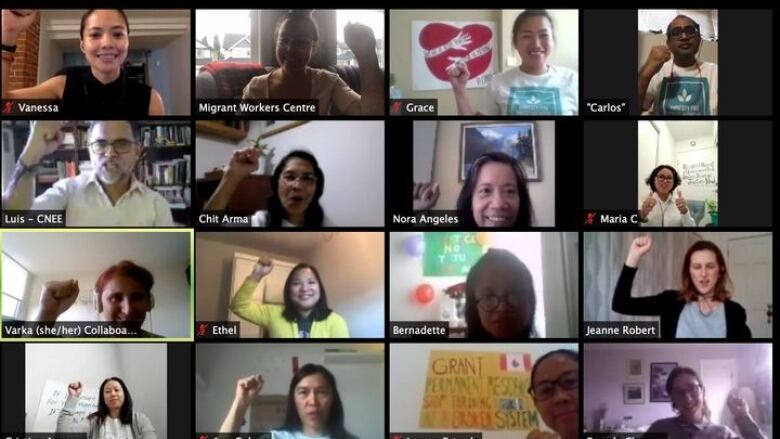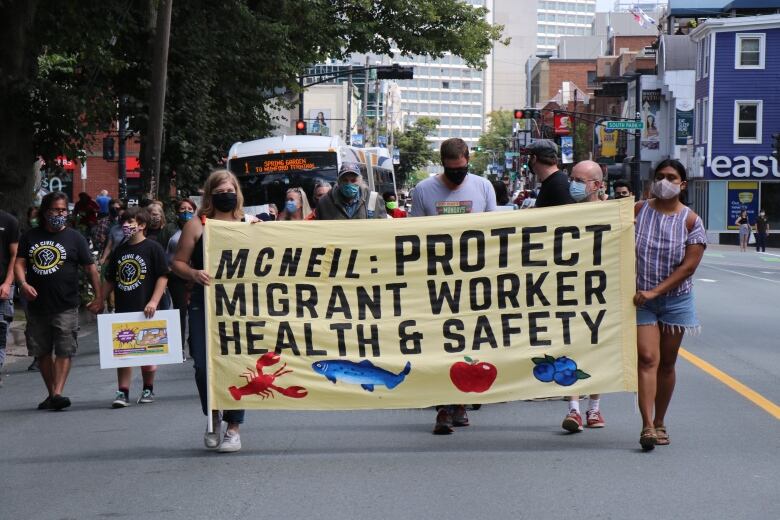B.C. migrant, undocumented workers rally for permanent residency program
'The pandemic has also exposed the extent to which theseessential workers do not enjoy essential rights'

Migrant workers and advocates called for a "justrecovery'' from the COVID-19 pandemic during a digital rally on Saturday based out of Vancouver.
The pandemic has shown how heavily Canada relies on migrant andundocumented workers to perform essential jobs, said Chit Arma, whochairs the Migrant Workers Centre's board of directors in Vancouver.
"The pandemic has also exposed the extent to which theseessential workers do not enjoy essential rights, and thelong-standing systemic problems with the temporary foreign workprogram that puts workers in an extremely precarious position,'' shesaid during the video conference.
The rally is part of the Amnesty for Undocumented WorkersCampaign led by the Migrant Workers Centre.
The campaign calls on the federal government to create a newpermanent residency program for all essential migrant andundocumented workers, and to allow the workers to apply for anopen-work permit while waiting for their applications to process.
No one at the Department of Immigration, Refugees and CitizenshipCanada could immediately be reached for comment.
On July 31, the federal government announced $58.6 million infunding that it said would boost protections for temporary foreignworkers and address COVID-19 outbreaks on farms.
Of that, $35 million was earmarked to improve health and safetyon farms and in employee living quarters to prevent the spread ofCOVID-19. About $7.4 million would support the workers, including $6million for direct outreach delivered through migrant supportorganizations, the government said.
'Recognizesprecariousstatus'
The government also said it was working to develop mandatoryrequirements to improve living conditions in employer-providedaccommodations.
In August, Immigration Minister Marco Mendicino announced atemporary measure to provide a pathway to permanent residency forasylum claimants working in health-care during the pandemic.
Under the measure, the front-line workers would be able to applyfor permanent residency if they met certain criteria, includinghaving madean asylum claim before March 13 and having been issueda work permit after their claim.
"This approach recognizes those with precarious immigrationstatus who are filling an urgent need and putting their own lives atrisk to care for others in Canada,'' the government said in a newsrelease.
Exclusions
Natalie Drolet, executive director of the Migrant Workers Centre,said the measure excludes other front-line workers like grocery storeclerks, truckers and care workers.
"While this is a positive step, it leaves too many migrantworkers and undocumented workers behind who have also been on thefront lines in the pandemic,'' Drolet said.
Migrants and undocumented workers play key roles as health-careworkers, grocery store clerks, cleaners, care workers, truckers andagricultural workers, Arma said.
More than 1,300 migrant workers in Ontario alone have beeninfected with COVID-19, she said. Three have died, including oneundocumented worker, she said.
'Fear of being removed'
Arma came to Canada in 2005 to work as a caregiver. Her temporarystatus in Canada gave her stress and anxiety, she said.
"I had papers, I had documents, and yet I had that fear of beingremoved, a fear of speaking up because I might be deported,'' shesaid.
"I can imagine how undocumented workers are experiencing evenworse because of the lack of documents they have.''

Maria Cano arrived to work as a caregiver in 2017 through thetemporary foreign worker program. She said the experience showed howdisempowering the experience could be, even before the pandemicstruck.
Cano worked for four different families and moved to threedifferent cities in her first few years. They expected her to work longhours without compensation, she said.
"When I spoke up, I lost my job,'' she said. "That entireprocess was very stressful and financially draining.''
She finally found a "nice Canadian family'' who treated her withrespect and sponsored her but said others shouldn't hope for thesame luck they should be protected with recognized rights instead.
"The COVID-19 pandemic makes it more difficult and stressful forall the undocumented and migrant workers in Canada,'' she said.
Beginning Dec. 15, the B.C. government will require employerswishing to hireforeign workers through federal programs to registerwith the province.
The government said in a news release Saturday that the measureswould ensure the workers are paid for the hours they work, haveaccurate job descriptions and ensure their rights and safety areprotected on the job.












_(720p).jpg)


 OFFICIAL HD MUSIC VIDEO.jpg)
.jpg)



























































































